Five Judge bench of Supreme Court vindicates abrogation of article 370 in J& K. Directs centre to restore J& K statehood
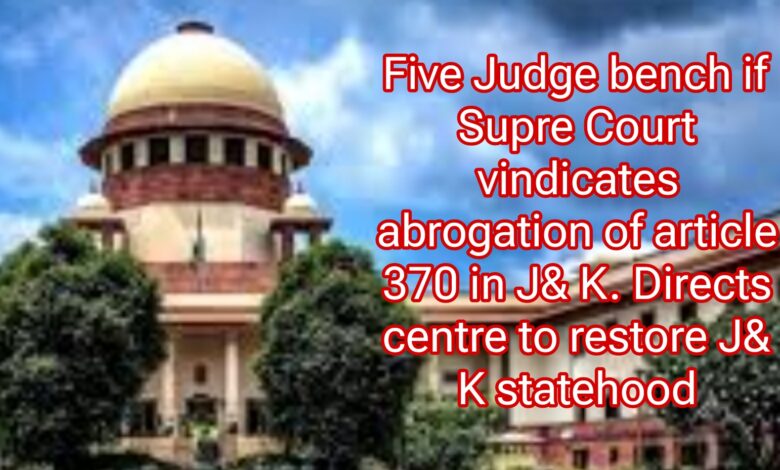
The Supreme Court has today vindicated the abrogation of Article 370 in Kashmir ruling that the action of the central government in this regard was constitutional.
The five judge bench of Supreme Court that included the chief justice D. Y. Chandrachud while hearing the petitions filed to revoke the central government’s decision on abrogation of special status of J & K by kicking of article 370, unambiguously said that the decision of the president of India to abolish article 370 is a constitutional exercise and since it is a temporary exercise subject to its revocation in future the highest court of the land can’t revoke the decision of the president.
The chief justice categorically said that Jammu and Kashmir doesn’t posses the separate internal sovereignty than the other states of the country.
The decision to abrogate article 370 in this strife torn state is for the cohesiveness / unification of the state.
He added that when the presidential proclamation is done in a state then the state under president rule has limitations on central powers.
After the proclamation of President’s rule every decision taken by the state does not come under the legal scrutiny or challenge.
This can lead to anarchy.
The chief justice D. Y. Chandrachud said that it wasn’t necessary or mandatory for the president that he or she should issue any veto or order on article 370 after the recommendations of the constituents assembly.
He emphatically added that by abrogating article 370 in the context of Jammu and Kashmir this is the process of annexing it ( J n K) with rest of the states of the country, thus bringing it at par with other Indian states.
Delivering his judgement on article 370, the chief justice D.Y. Chandrachud said that keeping in view the war like situation in the strife torn state of J and K and the country then , ( during partition) it was necessary to implement article 370 in Jammu and Kashmir as this was purely an internal constitutional arrangement.
Under article 370 ( 3) there is a special provision that the president has special powers to issue the notification about article 370 getting abrogated and even after the constituent assembly of J & K being abolished the article 370 will remain into existence.
The president is not bound by the recommendations of the constituent assembly said CJI. The Jammu Kashmir Samvidhan Sabha is a unstable body he said.
Chief justice D. Y. Chandrachud said that when the then King of Jammu and Kashmir Hari Singh had signed the accession of Jammu Kashmir pact with India, the sovereignty of that state was abolished then itself. It had already constitutionally merged into India. It meant then that J and K is an inalienable part of India. The Indian Constitution is above the J& K Constitution. Therefore article 370 was an unstable arrangement subject to its abrogation as and when necessary. He made is clear that we haven’t taken action on the president rule proclaimed then. The presidential rule in a state is imposed according to the warranted situation. Under Article 356, the president has full powers. Hence he or she ( president) can’t be challenged.
According to constitutional obligations the article 356 should be implemented by wisdom and rightfully. During the presidential rule the centre rules the state and the parliament acts in place of the state assembly. The Supreme Court’s five judge bench also ruled that after delimitation of constituencies the state should go to the polls at the earliest and also said that J and K should get the status of a state too as early as possible.


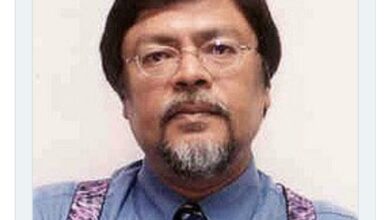
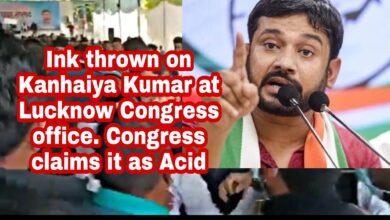
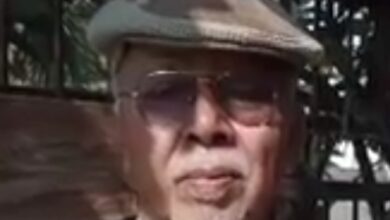
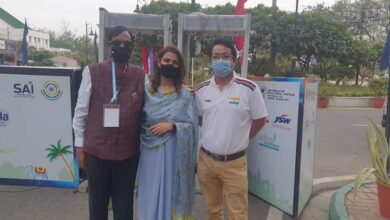

We have to respect the judgement of 5-judge bench of supreme court.